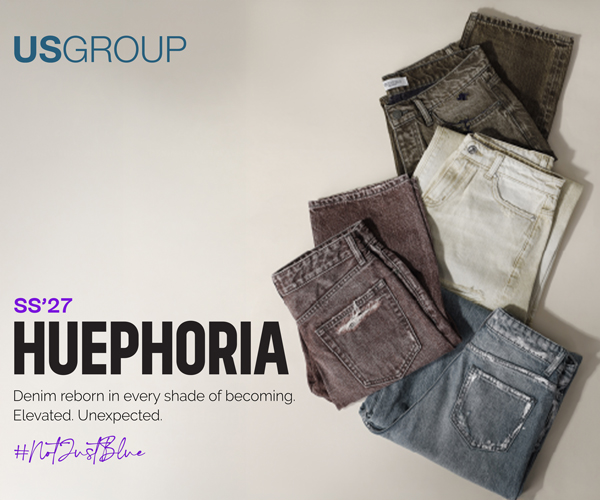No slowdown for innovation

With physical shows still not possible in most parts of the world, online shows, virtual presentations, webinars and seminars have been vital to keep the supply chain connected. Inside Denim rounds up some of the developments that mills presented at Kingpins24.
A growing desire to use waste as raw material is a focus for many mills’ research and development work. Circularity was discussed by many mills, unveiling their latest waste-using progress and recycled materials.
The team at Pakistani mill and manufacturer AFM showed how they are using their skills and experience to replicate effects and designs from conventional methods with recycled fibres, kinder chemicals and less water. A shredding and sorting facility, combined with the latest spinning machines, means they can achieve 100% post-industrial waste cotton fabrics, and blends with 40% post-consumer waste. AFM creative director Ampelio Dal Lago made a range by matching shades of recycled cotton without adding any indigo. “Recycling cotton is the major mission because it can save the environment,” he said.
During a panel chaired by Roian Atwood, Faiza Jamil from Artistic Milliners discussed the Pakistani mill’s Cradle to Cradle fabrics and Circular Park – a new sorting and shredding facility. “Circular is a design concept, not just recycling,” she said. “The way we have been designing things creates a lot of waste. Nature operates in a circular way and we must learn lessons from there.”
Marcel Imaizumi, chief operating officer at Vicunha, said the Brazilian company had been recycling content for two decades, but didn’t initially promote it as it was undervalued – “but now it adds value”. Its Tiger fabric is made with 100% recycled fabric including Tencel’s Ecomade, Refibra and recycled cotton.
Turkish denim producer Calik unveiled RE/J, a recycled denim fabric made from 100% pre- and post-consumer waste, which will be made available to buyers in time for the autumn-winter 2022 season. It uses Lycra’s EcoMade fibre (created with 68% recycled plastics and renewable plant-based resources), in addition to Repreve’s recycled polyester, derived from waste plastic bottles.
Nicholas Prophte, vice-president of sourcing, production and innovation at PVH Europe, said its circular strategy focuses on lower-impact materials, recyclability-minded design, traceability and new business models. A collaboration with Turkish denim mill Kipas has resulted in 80% pre-consumer and 20% post-consumer cotton fabric, with the intention to increase the latter to 30% in the short- to medium-term; 50:50 trials are also under way. Around 70-80% of all Tommy Hilfiger denim contains at least 20% post-consumer recycled content.
Hemp’s potential
Turning to hemp, Mr Prophte acknowledged the fibre’s potential as an alternative to cotton, but he also stressed the need to “dive deep” for full visibility in terms of production at farm level. He described European hemp as “mandatory” for the Tommy Hilfiger business and confirmed the company’s use of “real” (not cottonised) hemp. More will be revealed during PVH’s denim presentations this summer, he said.
Pakistan-based mill and manufacturer AGI Denim launched a fabric called HempX, a blend of organic cotton, hemp and elastane made with recycled components. The material is processed using the company’s Double Zero technology, which AGI claims saves 85% water compared with conventional indigo dyeing and finishing processes. It is also made using 50% renewable energy. The company will install solar panels at the factory by the end of this year, with a view of phasing out fossil fuel-based energy in the future.
AGI’s Henry Wong spoke about hemp as an “emerging champion” as he also announced a partnership with hemp processor Panda Biotech to develop US grown hemp. Wrangler and Lee-owner Kontoor has also newly partnered with the agricultural company.
Following the Pakistani government’s lifting of its ban on hemp growing in September last year, Lahore-based denim manufacturer Crescent Bahuman has partnered with green-minded designer Miles Johnson on Now or Never, an “all-natural and recyclable” hemp-centred denim collection. The collection is inspired by protests against climate change, both during the 1960s and today.
The collection includes blends of core-spun hemp yarn, Tencel lyocell and both organic and Better Cotton Initiative (BCI)-certified cotton, and uses “sustainable, waterless dyeing methods” – something that Mr Johnson pushed for. Zaki Saleemi, vice-president at Crescent Bahuman, elaborated: “Overall, there is a water saving of 98% in dyeing and 80% in finishing, thanks to the use of our latest Naya indigo dyeing process."
Jordan Nodarse, a designer at Turkish mill Bossa, introduced fabrics in the new collection as part of a conversation with Simply Suzette’s Ani Wells. As well as the environmental benefits of hemp, it enables a focus on slow fashion by adding durability and the possibility of creating more of a circular mentality, he said of the new collection Hempy. Bossa’s Xupple Stretch addresses the issue of inclusivity with extra stretch, and which could also help to minimise store returns. “It gives less concern about size and replaces that with comfort and positivity,” he said. Eco 3 “applies the full cycle of garment washing sustainability”: laser, eco stone, eflow, ozone technology and ecological chemicals.
Water saving
Bossa is also working with the Turkish government on a project to create a less thirsty cotton variety. The seed will be non-GMO (genetically modified) and the aim is that it will be finalised within three years. Business development director Besim Ozek said: “Hopefully, we will have a cotton seed called Bossa to show you.”The mill has reduced its water usage by more than 40% in two years, from an average of 70 litres per metre to 38 litres per metre. It is also creating laser- and ozone-friendly fabrics, which will help the laundries use less water, and making fabrics that will need to be washed less frequently by the consumer.
Water was also a focus at US-based Cone Denim, which unveiled its Road to Mission Zero initiative in collaboration with Spanish technology provider Jeanologia. Mission Zero denim will involve reducing water usage to “near zero” levels, and the goal is to return clean water back to nature. “People and the planet come first and that is why we decided to embark on a very important mission: to eliminate 100% of jeans water waste from fabric to final garment by 2025,” said Jeanologia CEO Enrique Silla. Cone’s initial denim offering draws from its Flash Finish fabrics (which, on average, save around 83% of water, 39% of chemicals and 14% of energy usage, it claims), made with Jeanologia’s G2 Dynamic ozone technology.
Berke Aydemir, head of R&D at Naveena, presented an antimicrobial range made with technology from Swedish company Polygiene. Mr Aydemir said this can extend the life of the garment, saves energy and water and reduces the carbon footprint. Niklas Brosnan, marketing director at Polygiene, said the collaboration is part of a wider education and marketing push to convince consumers to wash clothes less frequently. He claimed there is a groundswell building: “We want to change the mindset from consumables to durables,” he said.
The owner of Chinese mill Foison Textile, Sam Li, discussed the hardships of operating during the pandemic with Kingpins' Vivian Wang. He said the company had invested heavily in sustainability over recent years, including adding a photovoltaic panel system that supplies most of the factory’s energy, and that he is confident that 2021 will be a better year for textiles.
PHOTO: Calik Denim













